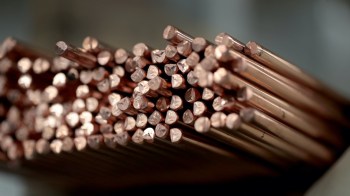Departing World Bank president looks back
Share Now on:
Departing World Bank president looks back
Kai Ryssdal: One of the higher-profile jobs in global economics comes open this summer. Robert Zoellick is stepping down as president of the World Bank. There’s a three-way race to succeed him, but chances are way better than even that the job will go to the American nominee, as it always has. Whatever the political baggage of running the World Bank might be, there are some economic realities as well.
Robert Zoellick retires the 30th of June. Mr. Zoellick, good to have you here.
Zoellick: Glad to be with you.
Ryssdal: You know, the global economy is obviously a much different place than what it was five years ago when you took over the World Bank. I mean, developing economies are growing, developed economies aren’t by and large anymore. So why do we still need the World Bank? Why can’t countries that need aid just go to the private capital markets — the ample private capital markets — and get what they need there?
Zoellick: Well the financial crisis was one good example. In the past five years, developing countries have provided two-thirds of global growth. Obviously you’ve got the Chinas, the Brazils versus the very poorest countries, those under $1,000 a year per capita income. In 2007, all of a sudden you see the markets lock up. We did about $250 billion of commitments and that was vital to keeping a lot of those countries going. I think it’s a mistake to see the bank as simply a financier. And you ask why is that important, well the world is a better place not only dealing with poverty, but frankly those are going to the sources of growth that help developed countries.
Ryssdal: This is a little bit sideways, but do you guys suffer from being called the World Bank? I mean, it’s not exactly an accurate nomenclature.
Zoellick: Yeah. In some of my speeches I make a point. I say, “Part of the problem is we are called bank.” Most people, at least until recent years, thought the bank’s primary function was to lend money. And really what our role is, it is a financing role. One of the things we’ve tried to do is use financing more innovatively. So, for example, I’ve created an asset management corporation under IFC, our private fund, that taps sovereign wealth funds, that taps pension funds to help the private sector grow in developing countries. And we do very innovative things to help with insurance for hurricanes or earthquakes or other aspects of incapacity.
Ryssdal: You’ll forgive me — and I don’t mean this to be pejorative — but you saying that you’re doing innovative things and, what’s that, complicated things with the financing that the World Bank does, it does remind you of what Wall Street did and what the big banks did three, four, five years ago and how we got into such trouble.
Zoellick: Well, we’re still a triple-A credit. We actually generate revenue that we plow back — not only to pay the staff, but to focus on poor people. So I guess part of this is how you run the place.
Ryssdal: You right in a piece in Foreign Policy not too long ago that developing countries are rightly demanding more of a say in how the global economy is run, and by extension how the World Bank ought to be run. Why then should the United States in who gets to the run the World Bank, who your successor is?
Zoellick: Well the United States is between 20-25 percent of the world economy. Now as for whether the president be from the U.S., my view is actually that it’s important for the United States to share some of these global responsibilities. The way that the system has worked, you’ve never had an American who’s head of the IMF, you’ve never had an American who’s head of the U.N., you’ve never had an American who’s head of the regional development banks. So if it’s not the World Bank, fine. But let’s make sure Americans stay in the game too because, frankly, it’s good for America and the world to engage in these institutions. They help America.
Ryssdal: Do you think the president’s nominee, Jim Yong Kim, is the best person to run the World Bank?
Zoellick: I think all the three candidates are very well qualified. I’ve had a brief chance to talk with him, I’ve looked at his background. I like his sort of scientific method because there is no one size fits all, you’ve got to actually test results and back. So I think that he would be an excellent candidate.
Ryssdal: Robert Zoellick, he’s president of the World Bank for the next couple of months. Thanks a lot for your time.
Zoellick: Glad to be with you.
There’s a lot happening in the world. Through it all, Marketplace is here for you.
You rely on Marketplace to break down the world’s events and tell you how it affects you in a fact-based, approachable way. We rely on your financial support to keep making that possible.
Your donation today powers the independent journalism that you rely on. For just $5/month, you can help sustain Marketplace so we can keep reporting on the things that matter to you.


















